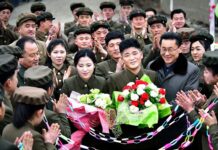[imText1]
The busiest time of year in North Korea is usually the rice-planting season between May and June. This year is no different; the authorities have mobilized the entire population to work on farms, meaning that adults and children alike face days of hard agricultural labor. The hours for official markets are also shortened at these times, and in some cases they are not allowed to open at all. This double-whammy only adds to the difficulty.
From the beginning of the farming season in April until rice planting begins in earnest in mid-May, collective farms have to prepare essential items like plastic sheeting, manure, fuel to run agricultural equipment and seedbeds. However, the reality is that, far from providing financial support to farm production, the authorities don’t even properly distribute rations. So, each year farms have to set aside a portion of the rice they produce in order to generate some of the agricultural supplies for the following season that they know the state will fail to offer up. They sell or exchange this stored rice so as to acquire the necessary goods on the open market.
If and when these preparations can be completed, the rice planting begins. This is generally around the middle of May. Right on time, on May 17th this year Rodong Sinmun ran an article entitled “Patriotic Love and a Day in May”, in which it reported that “the deeply meaningful first rice-planting of the year” had begun on May 12th at Chongsan Collective Farm in Gangseo County, South Pyongan Province.
Since rice planting requires a great many hands, soldiers, university, senior middle and elementary school students are all mobilized. Because this important national project determines the entire year’s agricultural output, when planting season comes the authorities will try everything to get people to throw themselves into agricultural tasks. The front page of Rodong Sinmun regularly features little other than inspiring agricultural tales.
Idolization of the Kim family is not missing from the process, however. The “Juche farming method,” allegedly conceived by Kim Il Sung, is propagated unceasingly, alongside Kim Jong Il’s pronouncements about agricultural preparedness.
Thus, when, as now, May comes around, North Korea transforms from a militant nation into a farming nation. Factory and enterprise workers report not to their regular workplaces, but to the fields. Secondary school and university students suspend their studies to go and plant rice. “Propaganda troupes” are organized by each city, county and village to inspire enthusiasm for work as well. Since rice planting is difficult and has to be done mostly by hand, people will readily compete for the comfortable places available on these song and dance troupes.
Residents of agricultural areas and some city dwellers also have to work on their own private plots during this time, and most enterprises do try to set aside time for them. One refugee who was formerly the head of such a state enterprise said, “The authorities don’t provide food supplies, so if they kept people from doing their their own work at these times it would be hard simply to survive. Since failing to go to work isn’t an option, heads of organizations tend to guarantee time for this.”
However, for those who normally make their living from trade it is simply a time of agony. “The agricultural mobilization period is like hell,” is a common refrain. People who trade during this time risk falling subject to ideological criticism as well, and can even be punished with reduced distribution of production later on.
One refugee who entered South Korea this year said, “People complain that ‘If they don’t give us food and force us not to work our own farms properly, does that mean they want us to starve to death?’…But if you don’t want punishment, you have to participate.”
Participants head for the fields at 4AM if they want to get all their tasks done. Some are so tired after working until late at night that they cannot get up, so the communal alarm sound of a gong is not uncommon. Students get off lightly, generally beginning their labor at 9AM. In some cases, classes are given group work assignments, but most of the time, work assignments are given individually. This is because giving individual assignments is meant to increase efficiency and build a sense of responsibility.
According to sources, students have been supporting the agricultural campaign since the beginning of May this year, but it is only since the middle of the month that they have been kept away from school to work in the fields. Sources note in particular that even elementary school students younger than ten have been mobilized for this agricultural mobilization campaign.
Of course, in the past elementary school students were frequently sent out into the fields for rice planting. Party officials liked to say, “Anyone who wants to eat rice has to go out into the fields.” They used another pretext, too, that, “We can only fight and defeat our enemies if we have good food supplies, and if we can’t finish rice planting at the right time crop yields drop significantly.” However, it seems that rarely has there been a case in which young children were mobilized as extensively as they have been this year.

















